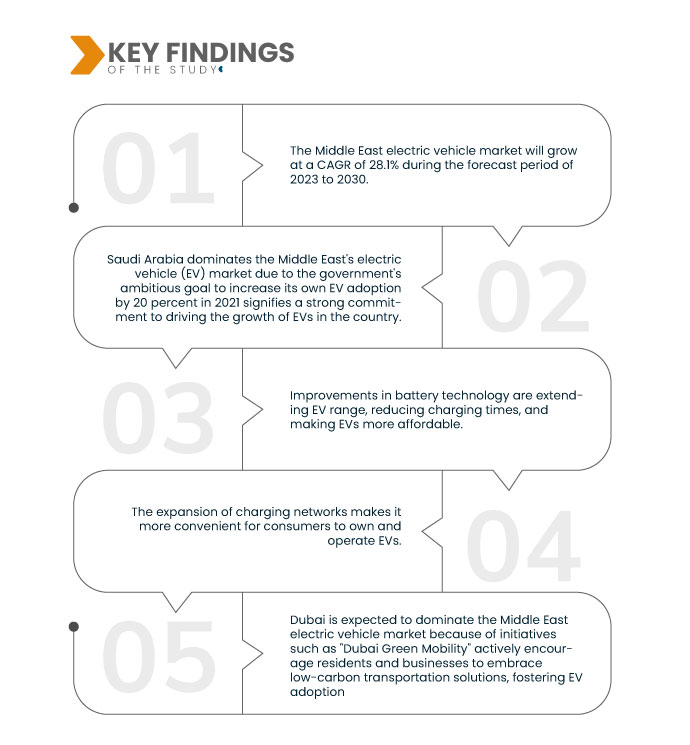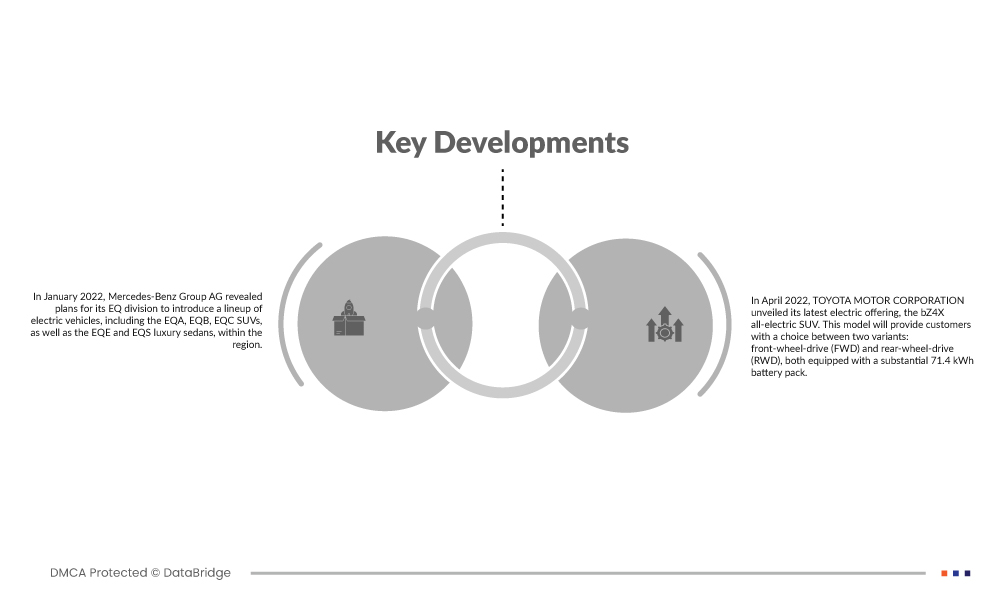The electric vehicle (EV) market presents numerous benefits, applications, and features. Benefits include reduced greenhouse gas emissions, lower operating costs, and a quieter, smoother driving experience. EVs find applications in personal transportation, public transit, and commercial fleets, addressing diverse mobility needs. Key features of electric vehicles encompass electric motors for instant torque, regenerative braking for energy recovery, and advanced infotainment systems. Additionally, EVs often incorporate autonomous driving capabilities, enhancing safety and convenience.
Access Full Report @ https://www.databridgemarketresearch.com/reports/middle-east-and-africa-electric-vehicle-market
Data Bridge Market Research analyses that the Middle East Electric Vehicle Market will grow at a CAGR of 28.1% during the forecast period of 2023 to 2030. Rising awareness of climate change and air quality issues is compelling consumers to embrace cleaner and sustainable transportation choices such as electric vehicles. These concerns drive a shift towards eco-friendly mobility, reducing greenhouse gas emissions and air pollutants while contributing to a more environmentally conscious future.
Key Findings of the Study
Consumer demand is expected to drive the market's growth rate
Consumer demand plays a pivotal role in the rapid growth of the electric vehicle (EV) market. Increasingly, consumers are drawn to EVs not only for their environmental benefits but also due to their impressive performance, sleek designs, and association with reputable brands. Modern EVs offer competitive acceleration, quiet rides, and cutting-edge features, attracting a broader demographic of buyers. Moreover, as automakers invest in EV development and expand their model offerings, consumers have more choices that align with their preferences, further fueling the surge in EV adoption and reshaping the automotive industry toward a sustainable, consumer-driven future.
Report Scope and Market Segmentation
|
Report Metric
|
Details
|
|
Forecast Period
|
2023 to 2030
|
|
Base Year
|
2022
|
|
Historic Years
|
2021 (Customizable to 2015-2020)
|
|
Segments Covered
|
Propulsion Type (Battery Electric Vehicle (BEV), Plug-In Hybrid Electric Vehicle (PHEV), Fuel Cell Electric Vehicle (FCEV) and ICE and Micro Hybrid Vehicle), Vehicle Drive Type (FWD, RWD and AWD), Vehicle Speed (Less than 100 MPH, 100 to 125 MPH and More than 125 MPH), Vehicle Class (Mid-Priced and Luxury), Sales Channel (OEM and Aftermarket), Power Output (Less than 100 KW, 100 to 250 KW and More than 25O KW), Electric Motor Type (Brushless DC Motors, Permanent Magnet Synchronous Motors, DC Motors and Three Phase Induction Motors), Voltage Range (Less than 48 Volt and More than 48 Volt), Charging Station Type (Normal Charging and Super Charging), Connectivity Type (V2G, V2X, V2V and V2B or V2H), Power Train (Series Hybrid, Parallel Hybrid and Combined Hybrid), Vehicle Type (Passenger Cars, Commercial Vehicle and Two Wheeler), Battery Type (Lithium Ion, Nickel Metal Hydride, Solid State, Lead Acid, and Sodium Ion Battery), Battery Form (Prismatic, Pouch, and Cylindrical).
|
|
Countries Covered
|
Saudi Arabia, U.A.E., Bahrain, Qatar, Kuwait, Oman, and Rest of Middle East.
|
|
Market Players Covered
|
BMW AG (Germany), Nissan Motor Co., Ltd. (Japan), MITSUBISHI MOTORS CORPORATION (Japan), Hyundai Motor Company (South Korea), Mercedes-Benz Group AG (Germany), Tesla (U.S.), TOYOTA MOTOR CORPORATION (Japan), Ford Motor Company (U.S.), BYD Motors Inc. (China), General Motors Company (U.S.), Mahindra & Mahindra Ltd. (India), MG MOTOR (China), JAGUAR LAND ROVER AUTOMOTIVE PLC (U.K.), Renault Group (France), Geely Automobile Holdings Limited (China), Lucid Group, Inc. (U.S.)
|
|
Data Points Covered in the Report
|
In addition to the market insights such as market value, growth rate, market segments, geographical coverage, market players, and market scenario, the market report curated by the Data Bridge Market Research team includes in-depth expert analysis, import/export analysis, pricing analysis, production consumption analysis, and pestle analysis.
|
Segment Analysis:
The electric vehicle market is segmented based on propulsion type, vehicle drive type, vehicle speed, vehicle class, sales channel, electric motor type, power output, voltage range, charging station type, connectivity type, power train, battery form, battery type, and vehicle type.
- On the basis of propulsion type, the Middle East electric vehicle market is segmented into battery electric vehicle (BEV), plug-in hybrid electric vehicle (PHEV), fuel cell electric vehicle (FCEV), and ICE and micro hybrid vehicle.
- On the basis of vehicle drive type, the Middle East electric vehicle market is segmented into FWD, RWD, and AWD.
- On the basis of vehicle speed, the Middle East electric vehicle market is segmented into less than 100 MPH, 100 To 125 MPH, and more than 125 MPH.
- On the basis of vehicle class, the Middle East electric vehicle market is segmented into mid-priced and luxury.
- On the basis of sales channel, the Middle East electric vehicle market is segmented into OEM and aftermarket.
- On the basis of electric motor type, the Middle East electric vehicle market is segmented into DC motors, brushless DC motors, permanent magnet synchronous motors, and three phase induction motors.
- On the basis of power output, the Middle East electric vehicle market is segmented into less than 100 KW, 100 to 250 KW, and more than 100 KW.
- On the basis of voltage range, the Middle East electric vehicle market is segmented into less than 48 Volt and more than 48 Volt.
- On the basis of charging station type, the Middle East electric vehicle market is segmented into normal charging and super charging.
- On the basis of connectivity type, the Middle East electric vehicle market is segmented into V2B OR V2H, V2G, V2V, and V2X.
- On the basis of power train, the Middle East electric vehicle market is segmented into parallel hybrid, series hybrid, and combined hybrid.
- On the basis of vehicle type, the Middle East electric vehicle market is segmented into passenger vehicles, commercial vehicle, and two wheeler.
- On the basis of battery type, the Middle East electric vehicle market is segmented into lithium ion, nickel metal hydride, solid state, lead acid, and sodium ion battery.
- On the basis of battery form, the Middle East electric vehicle market is segmented into prismatic, pouch, and cylindrical.
Major Players
Data Bridge Market Research recognizes the following companies as the major Middle East electric vehicle market players in Middle East electric vehicle market are BMW AG (Germany), Nissan Motor Co., Ltd. (Japan), MITSUBISHI MOTORS CORPORATION (Japan), Hyundai Motor Company (South Korea), Mercedes-Benz Group AG (Germany), Tesla (U.S.), TOYOTA MOTOR CORPORATION (Japan).
Market Developments
- In January 2022, Mercedes-Benz Group AG revealed plans for its EQ division to introduce a lineup of electric vehicles, including the EQA, EQB, EQC SUVs, as well as the EQE and EQS luxury sedans, within the region. These vehicles will be made available and supported through a network of 36 designated dealerships throughout the country. This strategic move signifies Mercedes-Benz's commitment to broadening its footprint within the region, enhancing its accessibility and presence in response to the growing demand for electric vehicles.
- In April 2022, TOYOTA MOTOR CORPORATION unveiled its latest electric offering, the bZ4X all-electric SUV. This model will provide customers with a choice between two variants: front-wheel-drive (FWD) and rear-wheel-drive (RWD), both equipped with a substantial 71.4 kWh battery pack. This strategic move reflects Toyota's commitment to extending its SUV lineup with options that offer enhanced driving range, catering to the evolving preferences and needs of its customer base.
Regional Analysis
Geographically, the countries covered in the major Middle East electric vehicle market report are Saudi Arabia, U.A.E., Bahrain, Qatar, Kuwait, Oman, and Rest of Middle East.
As per Data Bridge Market Research analysis:
Saudi Arabia dominates Middle East electric vehicle market during the forecast period 2023 - 2030
Saudi Arabia dominates the Middle East's electric vehicle (EV) market. The government's ambitious goal to increase its own EV adoption by 20 percent in 2021 signifies a strong commitment to driving the growth of EVs in the country. This initiative not only accelerates the shift towards sustainable transportation but also positions Saudi Arabia as a regional EV leader. Furthermore, the nation's extensive network of EV charging stations, the largest in the Middle East, is a vital infrastructure development.
Dubai is expected to dominate the Middle East electric vehicle market during the forecast period 2023 - 2030
Dubai is expected to dominate the Middle East electric vehicle market. Initiatives such as "Dubai Green Mobility" actively encourage residents and businesses to embrace low-carbon transportation solutions, fostering EV adoption. Furthermore, the Dubai Supreme Council of Energy has mandated that by 2020, 10 percent of all new vehicles in the Emirate must be electric or hybrid, with a goal of 10 percent of all cars being green by 2030. Saudi Arabia has also implemented incentives such as free charging stations, discounted car registrations, toll exemptions, extended warranties for EVs, free parking in select areas, and other perks to promote EV adoption nationwide.
For more detailed information about the Middle East electric vehicle market report, click here – https://www.databridgemarketresearch.com/reports/middle-east-and-africa-electric-vehicle-market












